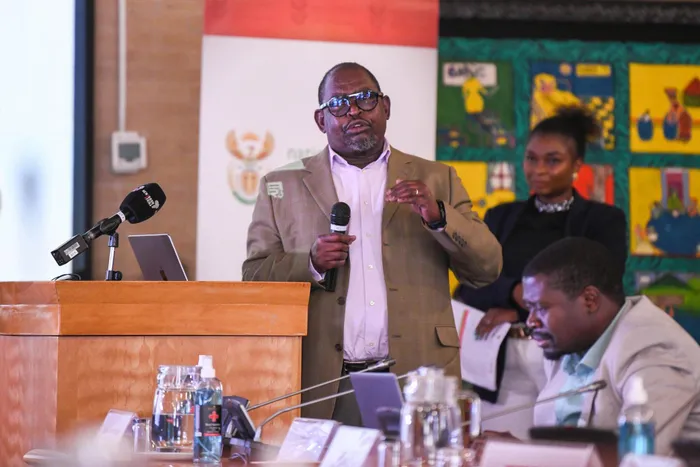Godongwana warns of rising unemployment and muted growth ahead of budget policy statement
TREASURY

Finance Minister Enoch Godongwana was speaking at the Macro Fiscal Workshop in which the National Treasury provided an overview of the country’s macro-fiscal situation and the choices the government faces.
Image: Treasury/X
Finance Minister Enoch Godongwana has warned that the rising levels of unemployment and muted economic growth in South Africa were posing challenges to the fiscus ahead of November's Medium-Term Budget Policy Statement (MTBPS).
This comes as the official unemployment rate in South Africa rose to its highest in one year from 32.9% in the first quarter to 33.2% in the second quarter as the jobless population surged by 140,000 in the three months to June, resulting in a total of 8.4 million individuals seeking work.
Godongwana on Friday announced that the MTBPS will be tabled on 12 November, setting the agenda for the three-year medium-term expenditure framework after protracted efforts to table the National Budget earlier this year.
“On the 12th of November, we'll be presenting the Medium-Term Budget Policy Statement, which kind of sets the parameters or the indicative for the next three years,” he said.
Godongwana was speaking at the Macro Fiscal Workshop in which the National Treasury provided an overview of the country’s macro-fiscal situation and the choices the government faces.
The fiscal policy engagement presented an opportunity for civil society organisations, businesses, professionals, and interested citizens to directly engage with the government regarding the trade-offs involved in setting the budget.
South Africa currently grapples with low economic growth, high debt, and competing demands for funding. To address these challenges, the government seeks to collaborate with society to foster a shared understanding of these realities and seek innovative ideas that can enhance fiscal sustainability.
Godongwana said there were many moving parts when the National Treasury was compiling the Budget.
“When you craft a budget, the economic context plays a critical role. Part of the challenges we have is persistent unemployment, poverty and inequality. Also we have a challenge of sluggish economic growth. What that means is complications for the revenue because the more growth in the economy, the more tax revenue we have,” he said.
“But what we do, first and foremost, what's important, we've got to say, how do we grow the economy? We’ve got to invest in this economy.”
Godongwana also addressed the issue of crippling national government debt levels, drawing attention to the necessity of maintaining fiscal credibility.
He said international lending institutions, particularly the International Monetary Fund (IMF), could borrow money to South Africa but at the cost of government jobs and social security spending.
“They will give you a loan but they will tell you a couple of things. They will say your salary costs are high, your entire package of social security is too generous. They will do all of those things so that you don't spend more money to save in order to pay them back,” Godongwana said
“You can't borrow unlimited. You can borrow up to the extent of being able to service that debt. The last thing we don't want to do is borrow to the extent that we can't. We must tighten our own belt.
“Even in cutting expenditure, it's limited in how far you can cut. We're in the process of correcting the budget and in an environment where it's not an easy task to increase taxes.”
As revenue generation avenues tighten, Godongwana said the government faces scrutiny over State-Owned Enterprises being prioritised at the expense of critical sectors like education and health.
He referenced a staggering R20 billion diversion from educational funding since 2008 to support struggling State entities.
“Because over the years, when we're funding State-Owned Enterprises, we underfunded education. R20bn between 2008 and 2023 funding, bailing out State-Owned Enterprises and undermining education,” he said.
“Where was that money coming from? From education and health.”
Godongwana also spoke of the need for collaborative engagement and understanding within the parliamentary budgetary framework since the recent budget process has underscored the challenges faced by Parliament as it navigates a new political landscape devoid of a single party holding a majority.
Traditionally, the budget process has been straightforward when one party—often the ruling party—holds more than 50% of the parliamentary seats. Debates culminated in the passage of budgets with relative ease. However, the current landscape presents a stark contrast.
In light of these complexities, Godongwana said there should be a re-evaluation of the skills within the Parliamentary Budget Office, and proposed holding workshops that include MPs from key committees, emphasising the need for sectoral collaboration.
Speaking at the Nedgroup Investments Treasurers’ Conference 2025, Nedgroup Investments managing executive Nic Andrew echoed Godongwana’s sentiments about unemployment and economic growth.
“Three key risks we see are policy uncertainty, infrastructure constraints, and low growth with high unemployment. These can be overcome with credible policy making, investment in energy, logistics, and water infrastructure, and a clear focus on pro-growth reforms,” Andrew said.
“With the right momentum, there is the appetite for investment, and South Africa can unlock the potential that investors are looking for.”
BUSINESS REPORT